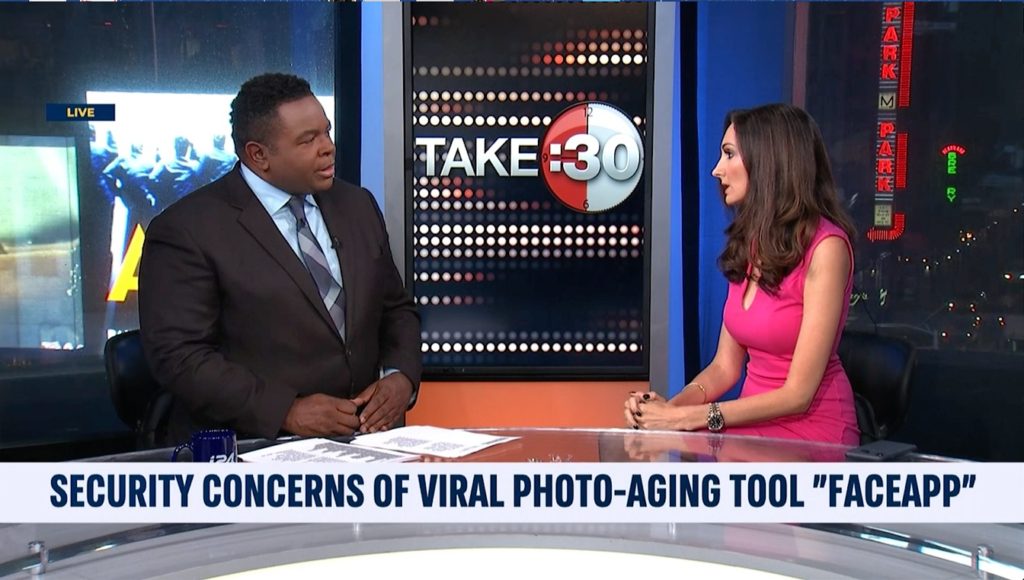|
Getting your Trinity Audio player ready...
|
Biometric Data Privacy Concerns
Ruby Media Group CEO Kris Ruby was recently on i24News discussing the privacy concerns surrounding FaceApp. Click here to watch the full segment.
Should you be concerned about FaceApp? Will your data be compromised?
If you are worried about the Russian’s access to your data, why are you not worried about access to your data that big tech companies hold here in the U.S.? The hypocrisy in this tech debate is the real issue.
Everyone is so focused on FaceApp they forget that domestic Silicon Valley big tech companies already have massive access to your data.. and who really knows what they do with it.
Social Media Expert Kris Ruby’s take on FaceApp below and why this is only the tip of the iceberg in the larger privacy debate with big tech in The U.S. as we enter the age of AI.
WATCH
- Is the best course of action to delete the app?
- How can social media users evaluate future apps and whether it’s safe to use them?
- What are the security concerns with the Russian owned app?
- When you post something on social media—-how safe is it?
PLUS
- What users should do to protect themselves.
- Has your data been compromised in a data breach? Check on Have I Been Pawned?

How can you protect your privacy and data?
Be mindful of what you publish and choose privacy-friendly platforms. For example, consider using Signal instead of Twitter direct messaging.
Remember: just because a platform says it is encrypted, doesn’t mean it actually is.
Twitter’s New Terms of Service
The new terms of service took effect on August 19, 2023. Here’s what you need to know:
Biometric Data
- Biometric Information. “Based on your consent, we may collect and use your biometric information for safety, security, and identification purposes.”
- Job Applications / Recommendations. “We may collect and use your personal information (such as your employment history, educational history, employment preferences, skills and abilities, job search activity and engagement, and so on) to recommend potential jobs for you, to share with potential employers when you apply for a job, to enable employers to find potential candidates, and to show you more relevant advertising.”
Kristen Ruby: Do not hand the keys of your biometric data to big tech.
As facial recognition technology accelerates, users need to be careful with the integration of this technology on social media platforms.
Voluntarily handing over your biometric data is the equivalent of giving someone your password or the keys to your house. According to social media analyst Kris Ruby, your face can be used to train AI models or AI-facial recognition algorithms.
When it comes to the evolving landscape of AI privacy, text-based copyright is not the only thing users should be concerned with. Your face is a form of copyright, too. You must be extremely careful with who you give permission to when accessing your biometric data.
“In the future, your face will be as important as a key to unlock your front door. Your face will be used to unlock everything from your phone to identity verification.” -Kris Ruby, CEO, Ruby Media Group
If you use your face to access financial institutions, this biometric data becomes extremely valuable to hackers, especially if your face is also used to access everything from your bank account to your financial statements.
The collection of biometric data
Biometric data collected by TikTok, such as facial recognition data, is a particularly valuable asset for digital surveillance.
Facial recognition is used:
- To open the wallet on your phone
- To train a machine learning model
- To access your bank or medical records
- To verify your identity
What are the potential risks of granting access to biometric data?
Until now, we have discussed the risks of your content being used to train a model. We haven’t addressed the security risk of your biometric data being used to train a model in the near future.
The integration of AI paired with biometric data is a lethal combination when it comes to the future of brain-computer interface mapping.
This risk is not only limited to social media companies.
Dating apps also encourage users to scan their faces for “verification” to prove they are real. This creates a surveillance hub of biometric data that can be used by law enforcement.
The Risks of Biometric Data
- Identity verification vs. exploitation.
- Prospect of biometric hacking.
- User rights regarding data usage, storage, and retention.
Unauthorized Access to Biometric Data
Biometric data is used for identity verification, but it can also be used against you if it lands in the wrong hands. Users have the right to know how their biometric data will be used and how long it will be stored for.
Users should be concerned about the prospect of biometric hacking – unauthorized access of biometric data – not only on this platform, but on every social media platform.
SOCIAL MEDIA FACEAPP PRIVACY CONCERNS INTERVIEW TRANSCRIPT:
Why would anyone want to age themselves by 50 years and then post it on social media? But everybody’s doing it with the new FaceApp. My friends, your friends, strangers on social media. It’s all over the place. Is there a catch with this new app or not?
Social Media Privacy Expert Kristen Ruby says yes.
We asked a social media analyst to break down why FaceApp went viral.
Here’s what you need to know about the risks of biometric data and AI.
Kris Ruby, a social media analyst and President of Ruby Media Group, joined i24 News.
Kris Ruby – Any time there is an app that is free, you are the product. That is the number one rule that people need to understand. And so we’ve seen this before. This has happened, you know, a few years back with other apps like this and it continues to happen every few years again.
Derricke Dennis – Should we be concerned then? If this has happened before, why are we talking about new concerns?
Kris Ruby – People are concerned because of the privacy issues and the information going to the Russian government. If you are concerned, read the terms of service and look at the server location. Look at the developer location and see where their servers are and where that information is going in addition to where it is hosted. Most people don’t actually ever do that and that is the big problem. The other concern is that in the future, your face and your facial features through AI will be a form of copyright. You want to be very careful who you give that access and biometric data to.
Derricke Dennis – The app is owned by a Russian company. But you’re saying just because it’s owned by a Russian company doesn’t necessarily mean that that’s the concern, right? It’s what they do with it.
Kris Ruby – From a legal perspective, they have irrevocable rights where they could take your face and use it on a billboard, they could do anything they want with it, but that is not. The terms of service are not that different from many other terms of service of US-based apps developed right here in The U.S.
Even with genetic testing and DNA companies, you’re giving away the license to your genetic code. And at some point, the risk can outweigh the benefits. That is the larger conversation here. It’s not just about this app. Ultimately, it is about the gradual loss of our privacy to create a social media surveillance system that we chose to opt into.
Derricke Dennis – New York Senator Chuck Schumer called for the FBI and The Federal Trade Commission to investigate this app. He is concerned that this app could be used for negative purposes.
Kris Ruby – It can be. His concern is valid here because he’s concerned with the Russian government and what they can do with the data. We’ve seen this happen with Cambridge Analytica and with many other social media companies as well. When it comes to consumer protection, data privacy, or lack thereof, you have to be in the driver’s seat.
Derricke Dennis – The company says this is overblown and they delete most of these pictures within 48 hours. They also said they don’t share your data with third-parties. Do you believe them?
Kris Ruby – I’m not sure if I believe them or not and I’m not sure if it even matters if we believe them because people are missing the mark on this story. It’s not just about them or this one app. How many companies domestically in The United States are doing the same thing? And why does no one seem to care about that? It’s a larger privacy discussion and debate that lawmakers in this country in particular have not caught up with yet. And that’s especially true when it comes to biometric data, social media privacy and artificial intelligence.
Derricke Dennis – Should we not use this app?
Kris Ruby – Don’t use this app. If you made the mistake of downloading it, then delete it. We don’t need to see what we will look like in 50 years. Just let gravity play out on your face. Read the terms of service and understand things catch up to you. Everything you do on social media leaves behind a digital footprint and a trail of digital breadcrumbs. This can be used against you in a court of law or in a legal proceeding or investigation.
The law often lags behind technological progress in The United States. Just because it seems safe to use now, doesn’t mean it actually is.
Kris Ruby: Despite the growing trend of biometric data usage, users should be well-informed of its perils.
READ: Biometric Data Collection Security Risks by Kristen Ruby
KRIS RUBY is the CEO of Ruby Media Group, an award-winning public relations and media relations agency in Westchester County, New York. Kris Ruby has more than 15 years of experience in the Media industry. She is a sought-after media relations strategist, content creator and public relations consultant. Kris Ruby is also a national television commentator and political pundit and she has appeared on national TV programs over 200 times covering big tech bias, politics and social media. She is a trusted media source and frequent on-air commentator on social media, tech trends and crisis communications and frequently speaks on FOX News and other TV networks. She has been featured as a published author in OBSERVER, ADWEEK, and countless other industry publications. Her research on brand activism and cancel culture is widely distributed and referenced. She graduated from Boston University’s College of Communication with a major in public relations and is a founding member of The Young Entrepreneurs Council. She is also the host of The Kris Ruby Podcast Show, a show focusing on the politics of big tech and the social media industry. Kris is focused on PR for SEO and leveraging content marketing strategies to help clients get the most out of their media coverage.
